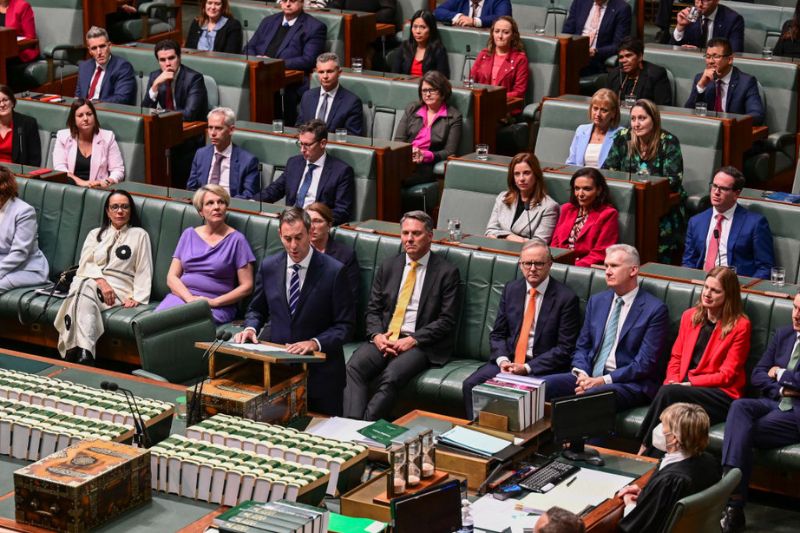Here’s what I always ask myself at budget time: are we idiots, tribespeople or citizens? The ancient Greeks categorised people into three groups. ‘Idiots’ were those considered self-interested, apathetic and detached from their community. ‘Tribespeople’ acted in the interests only of those in their own family, business and social circles. By contrast, ‘true citizens’ were committed to the common good. They would live, vote, give and work not only for themselves, but for others – especially those in greater need than them.

These ancient categories are a tad blunt and a touch reductive, but thousands of years later – and especially in budget week – we see glimpses of their enduring relevance.
As a policy adviser, I experienced the national budget rigmarole at parliament house six times in Government and once in opposition. Like a footy grand-final, some of the players and some of the content changed but the dynamics were ceaselessly repetitive. Some happy winners, some angry losers and many feeling like their team wasn’t even on the field.
This week’s budget revealed a government tap-dancing over some very tender eggshells. A chunk of covid-fuelled debt, a current surplus, a structural deficit, nagging inflation, creeping interest rates, shaky financial markets and widespread calls – from pretty much everyone – for help.
Providing cost of living relief without over-heating the economy is like tending a fireplace while trying not to warm the room past a certain temperature. To borrow comedian Michael Macintyre’s description of parenthood: It’s that feeling of drowning ... and then someone throws you a baby!
The Treasurer’s budget speech focused – unsurprisingly - on new money. Some extra cash for single parents, jobseekers, renters and aged care workers and some badly need help with medical and energy bills. Some think it’s enough, others think it’s too much. Most don’t think much about it at all.
Whatever the response, restricting our reaction to the headlines ignores the vast majority of how taxpayer money is spent. Around 90% of the national budget is forgotten during budget week. In my view, this neglect ignores something in which Australians can take great pride. Why? Because national budgets are moral documents as much as they are fiscal blueprints.
'The age of expressive individualism tries to make idiots of us. Our social media algorithms try to make tribespeople of us. But somehow, we retain our capacity to be true citizens. And on some level, we continue to carry each other’s burdens.'
Out of every $10 our national government spends on our behalf, more than $6 of it goes to pensioners, carers, low income families, the sick, and those with a disability. Every budget. Every year.
Leadership theorist Pete Drucker defined culture as ‘shared attitudes and beliefs’. If politics is downstream from culture, then our national accounts reflect what matters to us. National budgets are value-signals. And signals are important. They are – as per North African theologian St Augustine – physical things that point to metaphysical realities. Our national budget is more than just a marker of our input and our output, it’s an indicator of our moral throughput. Like engines combusting petrol, budgets run on values. And in large measure, we continue to follow an age-old practice of committing huge sums to those in need.
While we don’t think about it much publicly, scholars and thinkers – including award-winning historian Tom Holland - have traced aspects of the moral grammar underpinning our society back to the Bible. In this ancient collection of books, we are urged to be ‘repairers of the breach’, to ‘uphold the causes of the poor’, to ‘defend the weak’, to ‘carry each other’s burdens’.
When I was five years old, my father – then a newly arrived refugee in Australia – ran out of petrol while driving down a main street in a thunderstorm. He was stuck with no phone and a sick sleeping child in the backseat. Within minutes, a car heading in the opposite direction swung around and a man stepped out in the rain and helped us. It was a small thing but it didn’t feel small to us. My Dad still talks about it. For him it represented the best aspects of his adopted country.
There will always be room for improvement (and duelling definitions of what counts as improvement). However, no government or political party in our history – including this one - has found political capital in seeking to dismantle these underlying patterns of spending. Our public debate might be grumpier than we’d like. But thankfully, we’re not walking our talk.
Metereologically and economically, winter is coming. But we have implicit stores of warmth about which we should be more explicit. There are – to be sure – structural challenges we face fiscally. But there can always be structural integrity to how we face them morally.
The age of expressive individualism tries to make idiots of us. Our social media algorithms try to make tribespeople of us. But somehow, we retain our capacity to be true citizens. And on some level, we continue to carry each other’s burdens.
Max Jeganathan served as a political and social policy adviser in the Rudd and Gillard Labor governments. He is an Associate of the Centre for Public Christianity and is undertaking a PhD on the ethics of human dignity.
Main image: Treasurer Jim Chalmers hands down the 2023 Budget in the House of Representatives at Parliament House on May 09, 2023 in Canberra, Australia. (Martin Ollman/Getty Images)